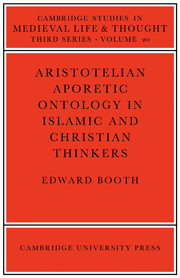Book contents
- Frontmatter
- Contents
- Preface
- Abbreviations
- 1 ARISTOTLE'S APORETIC ONTOLOGY AND THE RADICAL ARISTOTELIAN TRADITION
- 2 THE NEOPLATONIST INTERPRETATION OF ARISTOTLE'S ONTOLOGY
- 3 THE CHRISTIAN ARISTOTELIAN REACTION OF THE SIXTH CENTURY AND MONOTHEIST MODIFICATIONS TO THE NEOPLATONIST LEGACY
- 4 THE ARAB PERIPATETICS: AL-FĀRĀBĪ, IBN SĪNĀ AND IBN RUSHD; AND THE JEWISH PERIPATETICS: ABRAHAM BEN DAVID AND MOSES MAIMONIDES
- STASIMON: THE INTRODUCTION OF THE ‘NEW’ ARISTOTLE AND THE ARAB PERIPATETICS TO MEDIEVAL CHRISTENDOM
- 5 ALBERTUS MAGNUS: A LOGICO-EMANATIONIST FIGURE AS A MEANS OF ACCEPTING PERIPATETIC PHILOSOPHY INTO THE CHRISTIAN, PLATONIST TRADITION
- 6 THOMAS AQUINAS: THE ‘AUFHEBUNG’ OF RADICAL ARISTOTELIAN ONTOLOGY INTO A PSEUDODIONYSIAN-PROCLEAN ONTOLOGY OF ‘ESSE’
- Conclusion
- Appendix
- Bibliography
- Index
5 - ALBERTUS MAGNUS: A LOGICO-EMANATIONIST FIGURE AS A MEANS OF ACCEPTING PERIPATETIC PHILOSOPHY INTO THE CHRISTIAN, PLATONIST TRADITION
Published online by Cambridge University Press: 05 November 2011
- Frontmatter
- Contents
- Preface
- Abbreviations
- 1 ARISTOTLE'S APORETIC ONTOLOGY AND THE RADICAL ARISTOTELIAN TRADITION
- 2 THE NEOPLATONIST INTERPRETATION OF ARISTOTLE'S ONTOLOGY
- 3 THE CHRISTIAN ARISTOTELIAN REACTION OF THE SIXTH CENTURY AND MONOTHEIST MODIFICATIONS TO THE NEOPLATONIST LEGACY
- 4 THE ARAB PERIPATETICS: AL-FĀRĀBĪ, IBN SĪNĀ AND IBN RUSHD; AND THE JEWISH PERIPATETICS: ABRAHAM BEN DAVID AND MOSES MAIMONIDES
- STASIMON: THE INTRODUCTION OF THE ‘NEW’ ARISTOTLE AND THE ARAB PERIPATETICS TO MEDIEVAL CHRISTENDOM
- 5 ALBERTUS MAGNUS: A LOGICO-EMANATIONIST FIGURE AS A MEANS OF ACCEPTING PERIPATETIC PHILOSOPHY INTO THE CHRISTIAN, PLATONIST TRADITION
- 6 THOMAS AQUINAS: THE ‘AUFHEBUNG’ OF RADICAL ARISTOTELIAN ONTOLOGY INTO A PSEUDODIONYSIAN-PROCLEAN ONTOLOGY OF ‘ESSE’
- Conclusion
- Appendix
- Bibliography
- Index
Summary
The crisis of adaptation to the arrival of the new Aristotelian thought can be seen at its most intense, not in the unrest at the universities: the student strikes, the episcopal enquiries; nor among the modestly endowed innovators and traditionalists who made up the majority of the teachers – who repeated what they had learnt (whether heterodox or orthodox), but in the thought of two theologian-philosophers, both early members of the Order of Preachers founded by St Dominic in 1216, master and pupil, both subsequently declared to be ‘Doctors’ of the Church, both (owing to the challenge of the times) understandably voluminous in their writings: the Swabian Albertus ‘Magnus’, and the Lombard-Neapolitan Thomas Aquinas.
In considering the antecedents of their ideas the passive model of ‘influence’ is completely inappropriate, for with both there was a creative response to the intellectual confusion caused by the arrival in Christendom of the discordant Aristotelian thought, together with the lesser discord discernible among the peripatetics themselves. With Albert (?1193–1280) himself, the fusion of Platonist and Neoplatonist elements in the Christian tradition with peripapetic ideas is not only clever, but, given the forcefulness with which seemingly contrary, even mutually critical, theses were taken from their contexts and reassembled together in a unity, insistent and aggressive.
- Type
- Chapter
- Information
- Aristotelian Aporetic Ontology in Islamic and Christian Thinkers , pp. 163 - 204Publisher: Cambridge University PressPrint publication year: 1983



